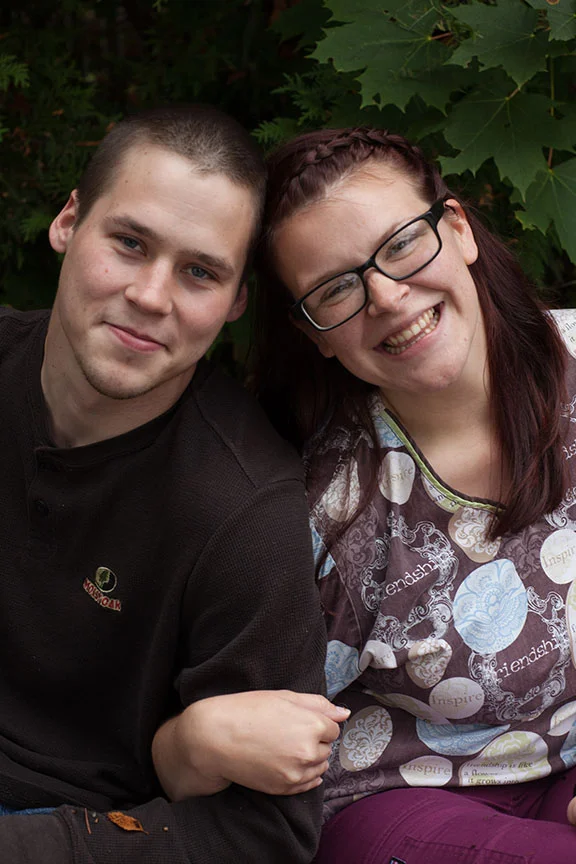Faith, Love, Loyalty
Photo by Patrisha McLean
By Patrisha McLean
Originally Published on VillageSoup.com
Oct 18, 2018
Camden — “One thing after another” left Jason and McKayla without a car, jobs, or place to live. He was 20 and she was 18. A friend offered her car for them to sleep in. But because the couple worried it would be too cold for their two-year-old daughter Hailee, they asked her to drive them to the homeless shelter on Old County Road.
“It was scary,” says McKayla.
But going there, “is one of the most important things we ever did.”
Now, three years later to the month, they are in a quiet, three-bedroom apartment in Union “with beautiful views,” and they drive a Ford Edge. McKayla is a medical assistant at Hope Health, in Camden, where one patient says “She is such a bright light. She is so warm and reassuring she makes me actually look forward to going to the doctor’s office.” On Jason’s second shift, making salad and pizza at Cuzzy’s restaurant, he says the manager said, ‘We’re going to move you to [the main cooking line] because you’re doing really, really good.’” I told you it was your niche,” McKayla tells him with her ever-present, sunny smile.
McKayla says she plans on becoming a registered nurse with advanced training, like her bosses at Hope Health. “That’s really cool,” Jason tells her.
Jason says their caseworker at the Hospitality House “was a miracle worker. The first night he put us up in a motel. It took 15 minutes.”
“We wanted to make sure we got on our feet quickly, mostly for Hailee” and, indeed, the team at the shelter and Knox County Homeless Coalition helped them get into their own apartment in one month. “Literally anything we needed they would bend over backwards to get for us,” Jason says of the caseworkers and staff. They provided rides to appointments, clothes, groceries and diapers; found them a car; helped find them the apartment and pooled funds from their own offices and the community for the deposit of first and last months’ rent.
One more thing: “We wouldn’t have had a wedding if it wasn’t for them,” McKayla says. “Stephanie [Fowles, house team leader] gave me her wedding dress, and Cindy [night staff] gave me a crocheted flower bouquet and made the cake.” Another night staffer, Zach, brought cider as a stand-in for champagne, bride and groom both being under 21. There were platters of party food serendipitously dropped off that day from someone in the community, and wedding photography from a shelter volunteer.
McKayla graduated high school from the Community School (“It was a great program”) while pregnant with their second child Jayson, then, because “I had dabbled in the medical field and always liked people,” got her medical assistant certification.
McKayla noticed while living at the homeless shelter that: “Everyone’s situation is unique. [The shelter staff] focuses on your situation. What they can do to help your problem. It’s definitely not a conveyor belt approach.
“Other places are messed up. All they do is give you a place to sleep, and then they kick you out when it’s morning. If they’re putting you out there as fast as they can, it sets you up for failure.”
McKayla says, “The Hospitality House is one of a kind. There is no other shelter you are going to find that takes that time with everybody who walks in the door. They get to the root cause of why you are homeless, and then they find a way to fix it. They really want you to succeed.”
Jason says “A lot of people didn’t see us working out because we had kids young, and got married young. Plus we got married while we were homeless. People judge you on being homeless and they think you’re going to keep falling back into it.”
He feels the trials and tribulations “were a test. Of faith, love and loyalty.”
“We’ve been through a lot together,” McKayla says, hand on his, then smiles big: “There’s nothing that can break us up now.”
It has been four years and eight months [at the time of publication: October, 2018] since the Hospitality House opened under new management. Since then, over 771 homeless people in our community— couch-surfing, sleeping outdoors in cars, campgrounds and, yes, storage units— have been placed into independent housing. Fifteen hundred and sixty people have been helped in some way — with jobs and education, learning life skills, applying for benefits to which they are entitled, getting medical help and gaining self-esteem and emotional stability.

